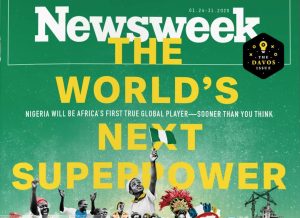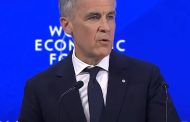By Adagbo ONOJA
Language, (or is it meaning-making?) is all that we have. Those who find it difficult to come to terms with this allege that the ‘linguistic turn’ in analytical philosophy is nothing but a movement from determinism to discursivisim. Well, they have work to do, work which nobody can do for them and work which they have to accomplish as quickly as possible or risk permanently unsatisfactory responses to all – time important question of how the world works. How the world works or why President Tinubu would trigger an alarm bell by saying what he must have thought was a tough presidential distancing act from the dimension of corruption he was addressing during his recent visit to Qatar.
Alas, his statement to investors in Qatar that any victim of pressure for bribe from any high state official should report such to him has turned to mean exactly the very opposite of what he must have thought he was doing. It all speaks to the slippery nature of a president on a world stage. In one minute, he could be saying what a bricoleur should be saying about his or her country as its chief story teller and Shaman. In another moment, the Shaman’s narrative can turn into a disaster in narrativity.

Language game in action!
While bashing the president at home for the untold hardship his policies have unleashed is warranted, it is important to note that this crisis of presidents on the world stage is not unique to Tinubu. It has more to do with the polysemous nature of words or language use. A word, a sentence or a phrase can mean a million different things to different listeners, viewers and readers. Above all, a president on a world stage is at a rally, an articulatory session with implications for imponderable consequences, depending on how he was heard by other presidents, prime ministers, brokers, arms merchants, oil magnates, intelligence chiefs, investors, editors, anchor men and women, diplomats and other rule writers of the so-called rule-based international order.
As such, a president on the world stage is always a nightmare for envoys, foreign affairs ministers and presidential spokespersons. It is because a single word could imply different consequences from different angles.
This time in Qatar, President Tinubu went on to say that whoever encountered bribe request from high state officials should report such to him. Someone who take words on their face value might not understand this more than a categorical denunciation of corrupt officials by the president and a commitment to deal ruthlessly with such. The question from someone taking a critical view of the statement would be how it is possible for the officials to be so prone to corruption but not so the president who appointed them. Such a situated reading will send a very clear signal to a critical observer that something is wrong about the president’s statement. Either the president is complicit in what he was denouncing or he has lost control of the Executive arm of government.
A yet another critical listener could come in from the position that since presidents receive briefings from intelligence and not so intelligence arms of diverse state institutions, he must be speaking about what he knows to be the culture by his own appointees and he was merely being rhetorical in the sense in which Plato understands rhetoric. All those who conclude that the president was speaking from experience will dismiss both him and his office in terms of seriousness in dealing with corruption. A set of the investors he was addressing could also assume that the president wants them to help him crack the corruption of his officials for him. Otherwise, are there no laws against corrupt practices in Nigeria and it there are, why don’t they work? And so on and so forth in terms of the plausible meanings of that seemingly straightforward denunciation of corruption. This multiplicity of meaning is compounded in the age of data when such statements will enter search machines and data bases of research centres, think tanks, office of presidents and prime ministers, universities and so on. It will be unimaginable what commotion the statement could bring into being from a sphere where algorithms process such statements based on data coding which benefit no further from human inferences. All these taking place in a world of open source intelligence beyond the control of state power should worry the handlers of the Nigerian president.

Language game in action!
In most other climes, the problem of a president on the world stage has attracted systematic responses. In most cases, presidents take a mock session to a select audience of the inner core of the staff before stepping out. It is not to get it 100% but to use simulation to knock off the nastiest of the plausible fiascos in the impending language game. Our neo-feudal orientation in Nigeria would make this improbable because presidents in Nigeria are supposed to be supermen who do not sleep on duty, who are above falling sick and if they do, it must be concealed at the status of state secrets and so on and so forth. How could such supermen submit themselves to stage managed rough tackles by his own spokesperson or information minister or such other officials? But what we pretend to find clumsy in a trial session is what we end up with on a world scale. Yet, it is not a problem elsewhere at all as all those who read Alan Greenspan’s Age of Turbulence of a memoir, for example, can bear witness.
While it is true that there is nobody in a higher authority who can amend what a president has said, it is even truer that, as the foremost echo chamber of the president when it comes to managing the outside world, the Minister of Foreign Affairs (or a presidential spokesperson) exists to amplify the president. Amplifying presents such a high state official opportunity to reinforce a particular meaning of a presidential position. It is the neatest and safest way of saving a bad situation arising from a presidential language game gone bad. The relationality of meaning that entitles listeners, viewers and readers to their own interpretation of a particular presidential position equally allows a Foreign Affairs Minister to emphasis a particular meaning of a presidential text, calling historicity to the help of argumentation. This is one of the cheapest means by which a Foreign Minister can effect a damage control, requiring nothing more than a swift whisper with his president.
Is it possible that President Tinubu is taking too long to transit from an agitator to a president? He still loves quarrelling a lot, if not with opposition leaders, then with labour. His aides are worse in their replies to perceived critics. To the extent that a president’s pronouncement affects both those who voted/endorsed and those who did not vote/endorse his rule, he must acquire the capacity to be measured. He might wish to be himself but Barack Obama and Mandela are still the models in presidents on world stage in contemporary times. Obama disarms his attackers of whichever breed. He does that by problematising the question in a manner that takes substance out of it. Alternatively, he gives an insight that bears the mark of the complexity of his own becoming, thereby inviting the questioner to think through the question better. Mandela, on the other hand, provides a narrative that either educates or ridicules his questioner, depending on where he thought the questioner was coming from in racial, ideological or discursive terms.
That our use of language or discourse is productive of what we call the real or reality is a well-established point in social analysis although how that works out is still a subject of contestation between different strands of discourse studies. If language is what constitutes reality, then any government, institution or high impact individual must reckon with language use in terms of how to constitute the Presidency as a serious and functional centre of power through the way it is mediated; how to mitigate the current level of disenchantment, gloom and anger and, lastly, how to materialise Nigeria to a world suspicious of her elite’s seriousness in terms of knowing their mission as a national elite. How else does the world relate to the Nigerian elite whose people should live in Heaven but are left groaning in hell on earth?.




























